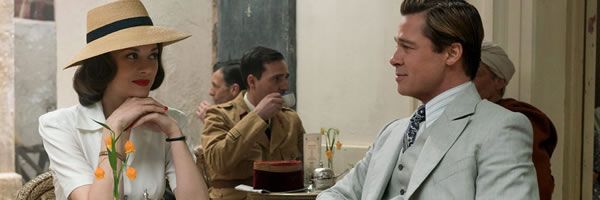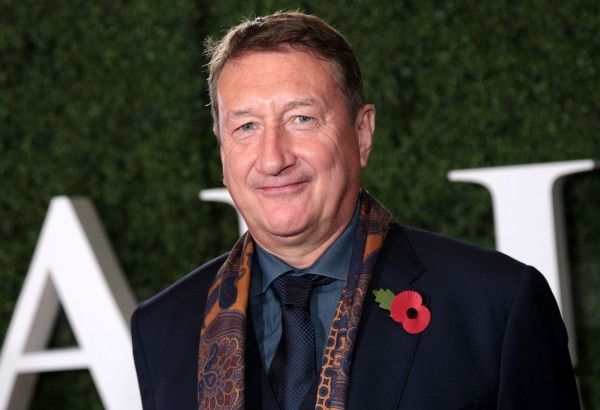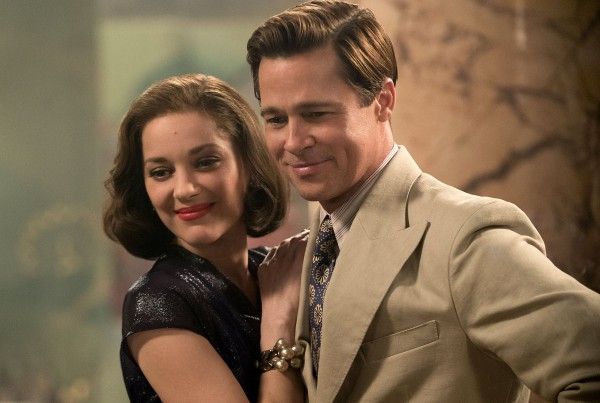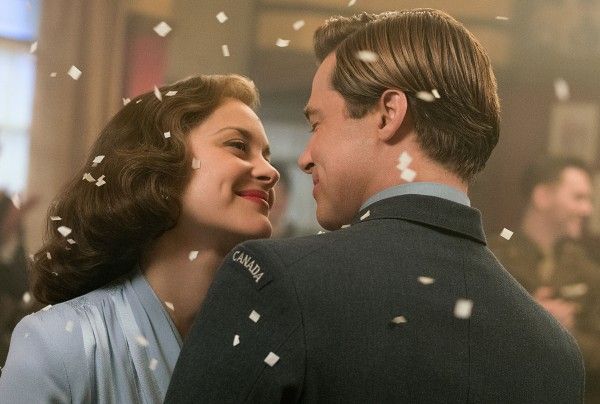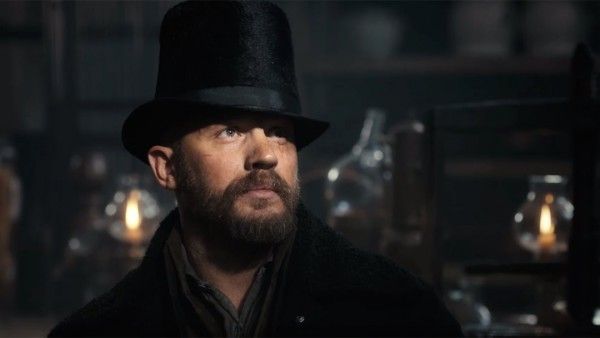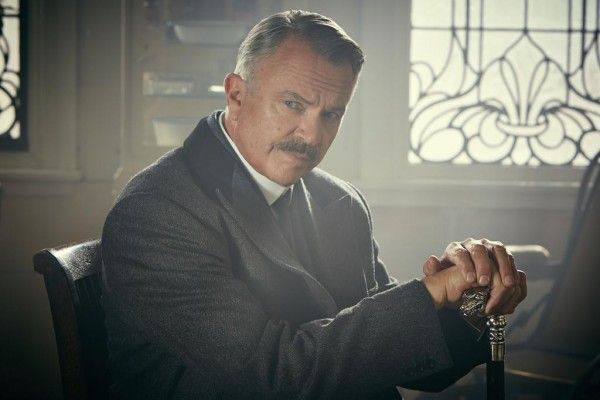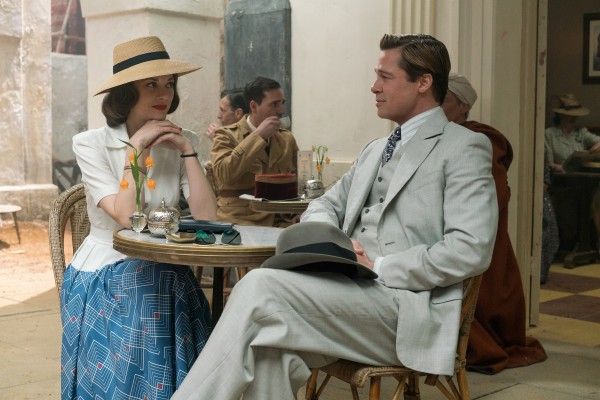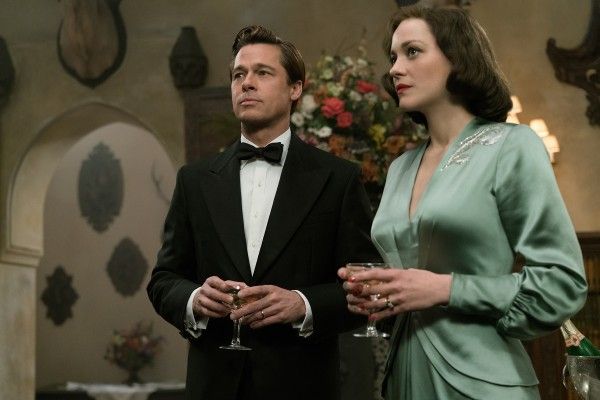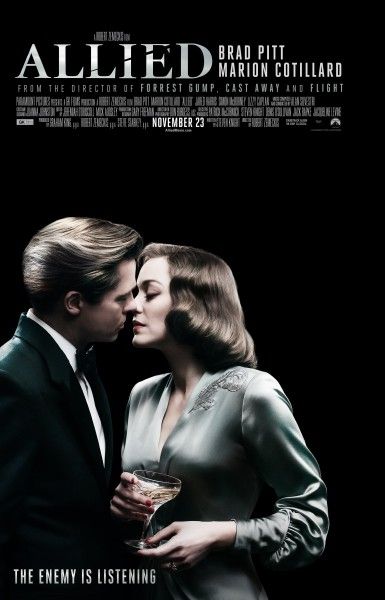From director Robert Zemeckis and screenwriter Steven Knight, the sweeping espionage thriller Allied is inspired by the real-life story of two undercover WWII spies who fell madly in love, only to be set mortally against each other when their true identities were exposed. In the film, secret operatives Max Vatan (Brad Pitt) and Marianne Beauséjour (Marion Cotillard) fall for each other in the middle of an extraordinarily risky mission, and instead of being able to leave it all behind, the husband and wife find themselves pitted against each other, in a test of loyalty and love that could ultimately have lethal consequences.
At the film’s press day, Steven Knight (who was also an executive producer on the film) spoke to Collider for this 1-on-1 interview about why this story stuck with him for so long, deleted scenes, the scene he was most nervous about, being on set for the shoot, and figuring out the film’s ending. He also talked about his upcoming TV series Taboo, The Girl in the Spider’s Web, the story of Caroline Weldon for Woman Walks Ahead, the World War Z sequel, Peaky Blinders and when he’ll return to directing. Be aware that there are some spoilers discussed.
Collider: How did this come about?
STEVEN KNIGHT: I was 21, when I heard the story that inspired this, and I wasn’t even a screenwriter then. Even then, I thought, “Oh, god, that would make a good film.” The story stayed with me, like a stray dog outside the office, waiting. And then, the time came where I was able to write an original screenplay, and it would be read and noticed. I had a meeting with Brad [Pitt], just around the time that he was making World War Z. I basically told him the story and said, “This is what I want to do,” and he really responded, so that helped me put the thing together and write it. And then, it got the attention of (director) Bob Zemeckis and Marion Cotillard. I’m glad I waited. If it had been made 15 years before, who knows how it would have looked, but it’s got the best possible cast, director and everything. It’s been fantastic. It was worth waiting.
How many times, over the years, did you think this was just never going to happen?
KNIGHT: I always thought it would never happen. And then, it became possible. In between commissions, I wrote it as an original screenplay. No screenplay is possible, unless you get some attachment from somebody who’s going to get it made, so when Brad responded, suddenly what was impossible became possible, which was great. But along the way, whenever I told the story, it had an affect on people. At its core, this was an effective story.
When you initially heard about this story, what was it that appealed to you and made you want to stick with the idea of turning it into a film, for so many years?
KNIGHT: Just the idea that someone is married and they’ve got a kid, and he reports for work one morning and his boss says, “You’re wife is a spy. Shoot her.” In the real story, he just went back and did it, which would have been a short film. Therefore, I had to spend some time exploring what you would do. And over the years, as you get experience of life, you wonder, “How would that feel?” I thought, “What an amazing thing to have happen.” It’s a betrayal, but it’s not a betrayal, in that sense. It’s a different sort of betrayal. So, I wanted to explore that by giving him time to find out more about his wife.
I thought it was a really interesting approach to a story like this to keep drawing it back to the personal relationship, which really allowed the audience time to get to know these people and care about them together. Was that a personal choice you intentionally wanted to make?
KNIGHT: It was essential, yeah. We need to invest in both of them before we suspect anything. It’s meant to be a film that’s a bit different. It’s roots are in the ‘40s and ‘50s, and that sort of filmmaking style.
How much did the story change and evolve, throughout the process of writing it? Is what we see now pretty close to what you had always envisioned?
KNIGHT: Yeah. In terms of how it looks, it’s fantastic and much better than I had hoped because it’s so lush and so beautifully executed. But the story itself is the story I wrote, and that’s what’s great about Bob. You have meetings, but it’s meetings for clarity, not to change what they’re saying or doing. He takes what’s on the page and executes it so brilliantly.
Are there any deleted scenes that we might get to see on Blu-ray/DVD?
KNIGHT: Whenever I see a cut of a film and something is gone, I don’t notice it unless it obviously should have been kept. With this, there were none like that. There were things that were written that were cut, and things that were shot that were cut, but if the film works, they are erased from memory.
What were you most nervous about seeing pulled off, in the film?
KNIGHT: The sandstorm, which I think is an absolute triumph, could have been awkward. It’s sex in a car, so who knows. And I think the rooftops look fantastic. And there was depicting London in the war, as well, and doing that in a way where you see something that you don’t normally see, which is how hedonistic it was. In reality, that’s what was going on. But, all of it worked.
Were you on set for the shoot?
KNIGHT: No, hardly at all. I visited the set a few times, and it was a great set to visit. A lot of it was in West London, in an old Gillette factory. You’d go into the factory through the security, and then there were a lot of camels and goats. Most sets are really dull, but this was fantastic. It felt like, “At last, I’m in Hollywood,” even though I was in West London. It was like, “This is how a film should be made.” It was beautiful. It’s great that the story is set in the ‘40s because the ‘40s feel to it is completely appropriate.
Marianne Beauséjour is such an interesting character because you really do feel for her. What was it like to have Marion Cotillard bring that character to life?
KNIGHT: It has to be an actress like that because there are so many levels to it. It’s set in the Second World War, when lots of people were doing things that, outside of a war, you wouldn’t do, like killing and dropping bombs. She’s doing things that one wouldn’t approve of, but it’s war. What I wanted to do was get two characters who fall in love for real, across the barricade, and then it transcends the war. He continues to love her and she loves him, and they both know it. To portray that, you need the best, and she was on a list of one.
Is the ending we see the only ending you had for this?
KNIGHT: No. There were three options, which were for him to shoot her, for them to escape, or for her to pull the trigger, which is a heroic act to spare him. When I was thinking about how it would end, a long time ago, I think I tried each of them to see, but two of them did not work.
What can audiences expect from your upcoming TV series, Taboo?
KNIGHT: It’s going to be great. Expect the unexpected, is what I’d say about Taboo. It’s different. I don’t think you’ve seen anything like it. It’s getting incredible responses, so fingers crossed.
What was it like to team up with Tom Hardy on that, and have him to bring the character to life?
KNIGHT: It’s such a gift when you know who you’re writing for and you know that that actor is capable of so much that you can relax a bit. And you know that when you suggest something on the page, it’s going to be there, plus more. It’s a great luxury to know that you don’t have to push it. You just lay it out, and it will be there.
Did you direct any of those episodes?
KNIGHT: I didn’t direct. I wrote all of them.
Have you thought about directing again?
KNIGHT: I’m doing it in April.
What’s that project?
KNIGHT: It’s a very different story, but it’s the story of a fisherman. It’s going to be shot in Bermuda.
Had you considered directing any of Taboo?
KNIGHT: No, I’ve been writing so much. And what happens with TV is that they split it into two blocks, so you get a director that does four and another director that does another four. You commit yourself to seven days a week, for 12 or 13 hour days for a long time. I couldn’t really do that.
You were hired to write The Girl in the Spider’s Web. What made you want to take that on, especially not having written the first film?
KNIGHT: A commission and an original are two different things, and both have their virtues and vices. A commission is a bit more collaborative, in that you outline the story that you think should be told, and then you write it. And then, there are notes and you change it, in the conventional studio system. But, it was great fun to do because of the central character. With The Girl in the Spider’s Web, the girl is really the central character. She’s the whole thing. It’s not really Blomkvist.
Is that more of a reboot, or is it a sequel to the David Fincher movie?
KNIGHT: It can’t be anything other than a sequel, but a couple of books have been skipped, so it is different, in that sense. It’s really taking a very strong central character and thinking, how do you execute this? It’s quite different.
So, will that have to be recast?
KNIGHT: I’m not supposed to talk about that.
What drew you to the story of Caroline Weldon for Woman Walks Ahead?
KNIGHT: That’s from a long time ago. I wrote that ages ago. It looks gorgeous and Jessica [Chastain] is so good that I’ve got high hopes. That’s from me being a very bizarre child. From the age of about 8 to the age of about 15, I was obsessed with Native Americans. I must have been about 11 when I read the book Bury My Heart at Wounded Knee, which I read, over and over again. It references this Little Eagle school in South Dakota for Sioux Indians, and that lead to saying, “I would love to have pen friends there.” About three months later, these letters came back and some of them were related to Sitting Bull. They were great-great grandchildren of Sitting Bull. So, I read more and more and I came across this character, Caroline Weldon. Sometimes in history, you find these people that no one would dare create. They’re too mad.
You also wrote the script for World War Z 2, quite awhile back.
KNIGHT: That’s an ongoing situation, I think. I’ve done the drafts for that, so we’ll see.
Is that in line with the first film, or will it feel very different?
KNIGHT: I don’t know. We’ll see. It’s not something I can talk about, really.
What do you like about writing for TV and spending more time with the characters, as opposed to writing one complete story for a film?
KNIGHT: There’s good and bad in both. Obviously, television is a writer’s medium, so you get a lot more power and authority. With a film, the discipline is having a beginning, middle and end, and having it work in a specific space of time. Suddenly, after years of television being the poor relation and film being everything, it now feels like film is a conjuring trick. It’s like, “Oh, my god, how are you going to do that in 90 minutes, as opposed to eight hours?! I’ve got so little time to do this!” It becomes an art form, in itself. Doing both helps you do each one.
What are you most proud that you got to accomplish with Peaky Blinders?
KNIGHT: There’s more to come. Series 4 is coming soon. But I’m proud of making my hometown, which is considered to be completely unfashionable, slightly fashionable. People actually know where it is now.
Are you surprised that that series took off, in the way that it did?
KNIGHT: Absolutely! I’ve spent three hours with Snoop Dogg, talking about how he loved it. And David Bowie loved it. The late Leonard Cohen was a fan. It struck a chord with various people that I didn’t think it would.
Why do you think that is?
KNIGHT: Snoop said it reminded him of how he got involved with gang culture. It’s always fantastically flattering when I see people dress like that and take on the look.
Allied opens in theaters on November 23rd.

